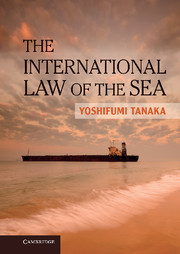Book contents
- Frontmatter
- Contents
- Preface
- Acknowledgements
- Figures
- Tables
- Abbreviations
- Table of Cases
- Table of Treaties and Instruments
- Part I The Divided Oceans: International Law Governing Jurisdictional Zones
- Part II Our Common Ocean: Protection of Community Interests at Sea
- 7 Conservation of Marine Living Resources
- 8 Protection of the Marine Environment
- 9 Conservation of Marine Biological Diversity
- 10 Marine Scientific Research
- 11 Maintenance of International Peace and Security at Sea
- 12 Land-Locked and Geographically Disadvantaged States
- 13 Peaceful Settlement of International Disputes
- Index
- References
9 - Conservation of Marine Biological Diversity
Main Issues
from Part II - Our Common Ocean: Protection of Community Interests at Sea
- Frontmatter
- Contents
- Preface
- Acknowledgements
- Figures
- Tables
- Abbreviations
- Table of Cases
- Table of Treaties and Instruments
- Part I The Divided Oceans: International Law Governing Jurisdictional Zones
- Part II Our Common Ocean: Protection of Community Interests at Sea
- 7 Conservation of Marine Living Resources
- 8 Protection of the Marine Environment
- 9 Conservation of Marine Biological Diversity
- 10 Marine Scientific Research
- 11 Maintenance of International Peace and Security at Sea
- 12 Land-Locked and Geographically Disadvantaged States
- 13 Peaceful Settlement of International Disputes
- Index
- References
Summary
Biological diversity, including marine biological diversity, is essential for human life. However, there are serious concerns that biological diversity on land and in the oceans is rapidly declining. Thus there is a strong need to establish legal frameworks for the conservation of marine biological diversity. In this regard, growing attention is being paid to the establishment of marine protected areas (MPAs). This chapter will explore emergent principles on this subject. In particular, the following issues will be examined:
What are the principal approaches to conservation of marine biological diversity?
What are the limits of the LOSC with regard to the conservation of marine biological diversity?
What is the significance of, and the limitations associated with the Convention on Biological Diversity in the context of the conservation of marine biological diversity?
What is the significance of MPAs and what are their limitations?
Is it possible to create MPAs on the high seas in positive international law?
Introduction
Biological diversity means the variability of life in all its forms, levels and combinations. Biological diversity is fundamental for human life because it provides essential services for the maintenance of the biosphere in a condition which supports human and other life. Furthermore, biological diversity has a considerable scientific value because all living species are genetic libraries which record evolutionary events on the earth. It may also be noted that biological diversity has its own ethical and aesthetic values. Given its vital importance for the survival of mankind, it could be said that conservation of (marine) biological diversity is considered as a community interest of the international community as a whole.
- Type
- Chapter
- Information
- The International Law of the Sea , pp. 312 - 334Publisher: Cambridge University PressPrint publication year: 2012



